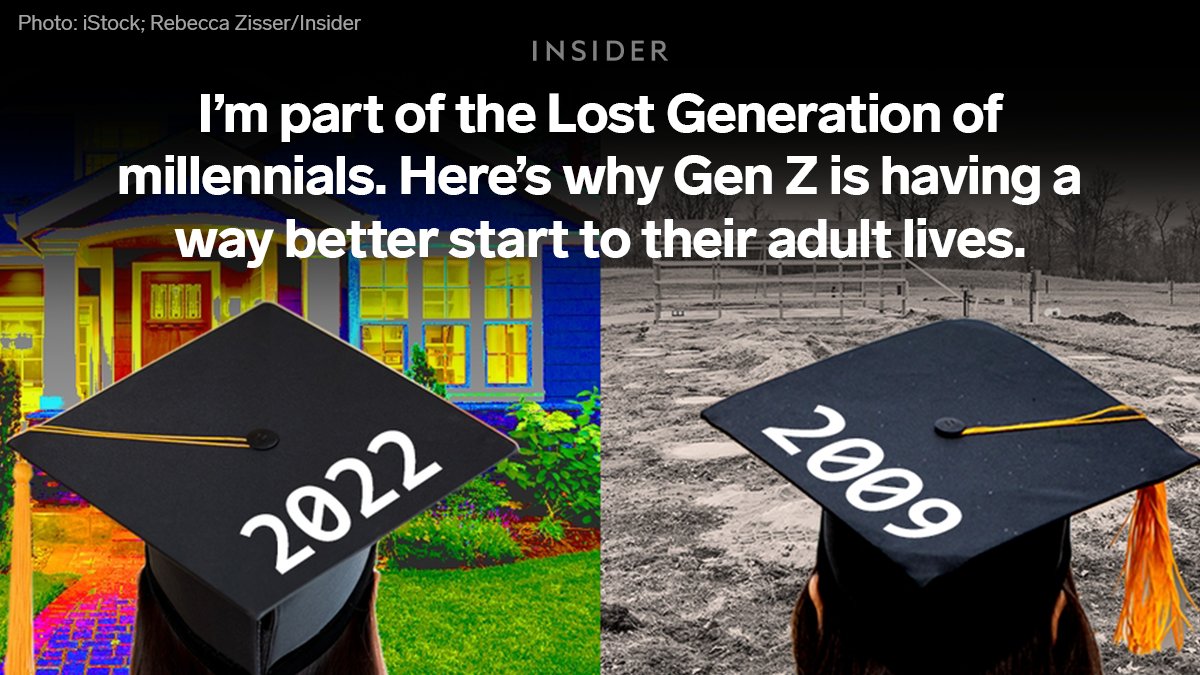
Two generations, two radically different fates.
Compared to millennials like Insider’s @AkiIto7, Gen Z is off to a way better start on their careers — and it may even mean they'll live longer. 👇
businessinsider.com/gen-z-is-the-l…
Compared to millennials like Insider’s @AkiIto7, Gen Z is off to a way better start on their careers — and it may even mean they'll live longer. 👇
businessinsider.com/gen-z-is-the-l…

In 2009, along with millions of fellow millennials, @AkiIto7 graduated from college into what was shaping up to be the worst job market since WWII.
During the Great Recession, few businesses were hiring anyone — let alone someone straight out of school.
businessinsider.com/gen-z-is-the-l…
During the Great Recession, few businesses were hiring anyone — let alone someone straight out of school.
businessinsider.com/gen-z-is-the-l…
It wasn't a good start for millennials’ financial future.
So in 2020, when the coronavirus pandemic shuttered vast portions of the economy, there were worries that another lost generation was in the making.
businessinsider.com/gen-z-is-the-l…
So in 2020, when the coronavirus pandemic shuttered vast portions of the economy, there were worries that another lost generation was in the making.
businessinsider.com/gen-z-is-the-l…
But this time, things played out very differently.
Thanks to huge government stimulus programs, the job market bounced back faster than even the most optimistic forecasters predicted.
businessinsider.com/gen-z-is-the-l…
Thanks to huge government stimulus programs, the job market bounced back faster than even the most optimistic forecasters predicted.
businessinsider.com/gen-z-is-the-l…

By year two of the pandemic, the recovery started to reach even the youngest workers. Today, employment levels for 20- to 24-year-olds are just 3% shy of what they were in February 2020.
businessinsider.com/gen-z-is-the-l…
businessinsider.com/gen-z-is-the-l…

Recessions harm everyone. But they harm some people more than others, and they almost always harm young people the most.
By the mid-2010s, even after the job market for young people had started to improve, millennials continued to suffer the aftershocks.
businessinsider.com/gen-z-is-the-l…
By the mid-2010s, even after the job market for young people had started to improve, millennials continued to suffer the aftershocks.
businessinsider.com/gen-z-is-the-l…

The financial repercussions for millennials went far beyond money:
👰 They weren't getting married.
👶 They weren't having kids.
🏠 They weren't buying homes or cars.
The economy had just placed them beyond their reach.
businessinsider.com/gen-z-is-the-l…
👰 They weren't getting married.
👶 They weren't having kids.
🏠 They weren't buying homes or cars.
The economy had just placed them beyond their reach.
businessinsider.com/gen-z-is-the-l…

When the pandemic slammed into the US economy, the initial hit to Gen Z was also huge.
In April 2020, teen employment dropped 38% from February levels, and employment levels for those in their early 20s plunged by 30%.
businessinsider.com/gen-z-is-the-l…
In April 2020, teen employment dropped 38% from February levels, and employment levels for those in their early 20s plunged by 30%.
businessinsider.com/gen-z-is-the-l…

But this time, learning from the Great Recession, the government didn't hang young adults out to dry.
Congress and the Fed moved fast and aggressively to resuscitate the economy, and the Biden administration rolled out protections for recent grads.
businessinsider.com/gen-z-is-the-l…
Congress and the Fed moved fast and aggressively to resuscitate the economy, and the Biden administration rolled out protections for recent grads.
businessinsider.com/gen-z-is-the-l…

Today, nearly two years into the pandemic, Gen Zers aren't just holding steady — they're thriving. The unemployment rate for 20- to 24-year-olds is just half a percentage point higher than it was in February 2020.
businessinsider.com/gen-z-is-the-l…
businessinsider.com/gen-z-is-the-l…

What does all this mean for the future?
Gen Z still faces economic hurdles. Most of them are still in school, and the pandemic's disruption to their education could have serious implications for their earnings and productivity in the years ahead.
businessinsider.com/gen-z-is-the-l…
Gen Z still faces economic hurdles. Most of them are still in school, and the pandemic's disruption to their education could have serious implications for their earnings and productivity in the years ahead.
businessinsider.com/gen-z-is-the-l…
But given the economy's quick recovery, Gen Z is unlikely to suffer from the kind of long-term recession scars inflicted on previous generations.
businessinsider.com/gen-z-is-the-l…
businessinsider.com/gen-z-is-the-l…
Gen Z won't turn out to be another Lost Generation. They may or may not prove to be another Greatest Generation. But for now, at least, they're the Luckiest Generation.
Subscribe to @thisisinsider to read the full story: businessinsider.com/gen-z-is-the-l…
Subscribe to @thisisinsider to read the full story: businessinsider.com/gen-z-is-the-l…
• • •
Missing some Tweet in this thread? You can try to
force a refresh












